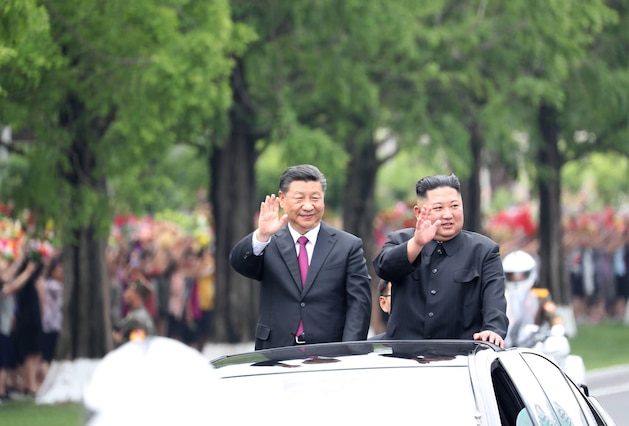North Korea’s ruler Kim Jong-un was testing new missile carriers for nuclear warheads just a few hours into the new year. China uses him as a stooge to keep other nations in check.
The New Year was only three hours old when the North Korean regime tested new missile carriers for nuclear warheads.
Ruler Kim Jong-un, who is starving his people in order to be able to bear the immense costs of his military, proudly proclaimed that with it one could reduce every corner of South Korea to rubble.
The nuclear threat on the Korean peninsula is real. Experts have been assuming for a while that North Korea has nuclear warheads. Kim also calls the newly tested missile system an offensive weapon.
The regime in Pyongyang is diplomatically isolated and subject to far-reaching sanctions. However, the Chinese dictatorship is sticking to its little neighbor.
Beijing is using Kim as a stooge to keep the democratic nations of East Asia, South Korea, Japan and Taiwan, and their most powerful ally, the United States, busy and in check.
In view of a nuclear escalation on Ukrainian soil threatened by the Kremlin, Beijing claims that it does not approve of the use of nuclear weapons. At the same time, Chinese dictator Xi Jinping supports Pyongyang’s military ambitions.
Weapons are said to have been brought from North Korea to the front in Ukraine with the support of the People’s Republic. This shows that the new axis of evil is gradually expanding and consolidating from Moscow, via Beijing and Pyongyang.
And Iran is also involved: the mullahs are sending Iranian drones into Putin’s offensive battle in Ukraine, which violates international law, Xi is meeting with the Iranian dictator Raisi, and Tehran is also maintaining extensive cooperation with Pyongyang.
Democratic and free South Korea reacted promptly to the provocations from the north and called on Kim to moderate the regime. But he doesn’t think about it.
In keeping with the style of the Kremlin dictator Putin, he claims that his nuclear program is only a reaction to provocations by others, namely South Korea, Japan and the USA.
In view of this new formation of the terror regimes, it even seems possible that the war between North and South Korea will flare up again. Due to China’s aggressive policy in the western Pacific, this and other warlike escalations are possible at any time.
An attack on South Korea, like the invasion war against democratic and free Taiwan envisaged by Xi, would make the United States and Japan a war party.
A conflagration could turn into a world war in no time at all. An end-time battle to the liking of self-adoring dictators who believe they are doing Heaven’s will.
Beijing is also at odds with the Philippines and has had islands belonging to Manila occupied by mercenaries whose actions are reminiscent of Putin’s captors in eastern Ukraine. In addition, artificial islands were heaped up and militarized.
President Ferdinand Marcos Jr. will visit Beijing this week. As Beijing usually does, he will be offered one or the other economically attractive deal.
In return, dictator Xi expects Manila to stand still when it comes to his ambitions in the West Philippine Sea.
The two sides are expected to establish direct communication on the maritime issues to minimize the risk of accidental war breaking out.
However, this carrot-and-stick game by Beijing must not lead one to believe that Xi Jinping will abandon his intention to bring the entire western Pacific under Chinese control.
Pyongyang and Kim Jong-un’s desire for escalation must be seen in the context of what is happening in this region of the world as a whole. The rhetoric of the dictators Putin, Xi and Kim is similar, as are the conflicts they trigger or threaten to trigger.
In view of this development, one no longer wants to wish for a happy new year.
Alexander Görlach is Honorary Professor of Ethics at Leuphana University in Lüneburg and Senior Fellow at the Carnegie Council for Ethics in International Affairs in New York. After stints in Taiwan and Hong Kong, he has focused on the rise of China and what it means for East Asian democracies in particular. From 2009 to 2015, Alexander Görlach was also the publisher and editor-in-chief of the debate magazine The European, which he founded. Today he is a columnist and author for various media. He lives in New York and Berlin.
